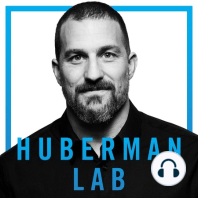110 min listen
Improve Flexibility with Research-Supported Stretching Protocols
FromHuberman Lab
ratings:
Length:
125 minutes
Released:
Jun 13, 2022
Format:
Podcast episode
Description
In this episode, I explain the science behind limb range of motion and flexibility and how to increase them by using science-supported protocols. Flexibility is crucial for physical movements and can help prevent injuries, decrease inflammation, modulate physical and mental pain, impact exercise recovery speed and even potentially slow the progression of certain diseases. I explain the biology of flexibility, including the specific neural mechanisms that sense stretch and load (i.e., tension) on the muscles and limbs, as well as how specific brain regions like the insula combine those signals to ultimately control limb range of movement. I also provide science-based stretching and “micro-stretching” protocols that reliably improve limb flexibility with the minimum necessary time investment. I review all the details of those stretching protocols: how often to do them, for how long, their timing relative to other exercises, sets, the time between sets, measuring progress and more. All people, physically active or not, should benefit from the information and tools described in this episode.
Thank you to our sponsors
Thesis: https://takethesis.com/huberman
InsideTracker: https://insidetracker.com/huberman
Eight Sleep: https://www.eightsleep.com/huberman
Supplements from Momentous
https://www.livemomentous.com/huberman.
For the full show notes, visit hubermanlab.com.
Timestamps
(00:00:00) Flexibility & Stretching
(00:02:57) Thesis, InsideTracker, Eight Sleep
(00:07:22) Innate Flexibility
(00:09:23) Movement: Nervous System, Connective Tissue & Muscle; Range of Motion
(00:17:51) Golgi Tendon Organs (GTOs) & Load Sensing Mechanisms
(00:20:20) Decreased Flexibility & Aging
(00:22:38) Insula, Body Discomfort & Choice
(00:30:02) von Economo Neurons, Parasympathetic Activation & Relaxation
(00:42:00) Muscle Anatomy & Cellular ‘Lengthening,’ Range of Motion
(00:47:16) Tool: Protocol - Antagonistic Muscles, Pushing vs. Pulling Exercises
(00:51:57) Types of Stretching: Dynamic, Ballistic, Static & PNF (Proprioceptive Neuromuscular Facilitation)
(00:59:36) Tool: Increasing Range of Motion, Static Stretching Protocol, Duration
(01:05:56) Tool: Static Stretching Protocol & Frequency
(01:13:55) Tool: Effective Stretching Protocol
(01:17:12) Tool: Warming Up & Stretching
(01:19:17) Limb Range of Motion & General Health Benefits
(01:25:30) PNF Stretching, Golgi Tendon Organs & Autogenic Inhibition
(01:31:23) Tool: Anderson Protocol & End Range of Motion, Feeling the Stretch
(01:32:50) Tool: Effectiveness, Low Intensity Stretching, “Micro-Stretching”
(01:41:33) Tool: Should you Stretch Before or After Other Exercises?
(01:45:41) Stretching, Relaxation, Inflammation & Disease
(01:51:37) Insula & Discomfort, Pain Tolerance & Yoga
(02:00:36) Tools: Summary of Stretching Protocols
(02:03:00) Zero-Cost Support, YouTube Feedback, Spotify & Apple Reviews, Sponsors, Momentous Supplements, Instagram, Twitter, Neural Network Newsletter
Title Card Photo Credit: Mike Blabac
Disclaimer
Thank you to our sponsors
Thesis: https://takethesis.com/huberman
InsideTracker: https://insidetracker.com/huberman
Eight Sleep: https://www.eightsleep.com/huberman
Supplements from Momentous
https://www.livemomentous.com/huberman.
For the full show notes, visit hubermanlab.com.
Timestamps
(00:00:00) Flexibility & Stretching
(00:02:57) Thesis, InsideTracker, Eight Sleep
(00:07:22) Innate Flexibility
(00:09:23) Movement: Nervous System, Connective Tissue & Muscle; Range of Motion
(00:17:51) Golgi Tendon Organs (GTOs) & Load Sensing Mechanisms
(00:20:20) Decreased Flexibility & Aging
(00:22:38) Insula, Body Discomfort & Choice
(00:30:02) von Economo Neurons, Parasympathetic Activation & Relaxation
(00:42:00) Muscle Anatomy & Cellular ‘Lengthening,’ Range of Motion
(00:47:16) Tool: Protocol - Antagonistic Muscles, Pushing vs. Pulling Exercises
(00:51:57) Types of Stretching: Dynamic, Ballistic, Static & PNF (Proprioceptive Neuromuscular Facilitation)
(00:59:36) Tool: Increasing Range of Motion, Static Stretching Protocol, Duration
(01:05:56) Tool: Static Stretching Protocol & Frequency
(01:13:55) Tool: Effective Stretching Protocol
(01:17:12) Tool: Warming Up & Stretching
(01:19:17) Limb Range of Motion & General Health Benefits
(01:25:30) PNF Stretching, Golgi Tendon Organs & Autogenic Inhibition
(01:31:23) Tool: Anderson Protocol & End Range of Motion, Feeling the Stretch
(01:32:50) Tool: Effectiveness, Low Intensity Stretching, “Micro-Stretching”
(01:41:33) Tool: Should you Stretch Before or After Other Exercises?
(01:45:41) Stretching, Relaxation, Inflammation & Disease
(01:51:37) Insula & Discomfort, Pain Tolerance & Yoga
(02:00:36) Tools: Summary of Stretching Protocols
(02:03:00) Zero-Cost Support, YouTube Feedback, Spotify & Apple Reviews, Sponsors, Momentous Supplements, Instagram, Twitter, Neural Network Newsletter
Title Card Photo Credit: Mike Blabac
Disclaimer
Released:
Jun 13, 2022
Format:
Podcast episode
Titles in the series (100)
How to Lose Fat with Science-Based Tools | Episode 21: This episode I describe the science of fat loss, including how fat is mobilized and oxidized (burned) and how to increase fat burning by leveraging the nervous system. Most people don't realize it, but our neurons connect to our fat and release... by Huberman Lab
